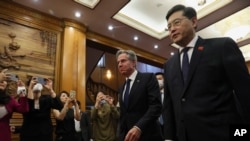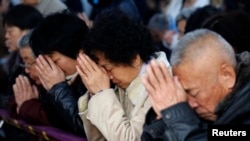During his visit to Beijing, U.S. Secretary of State Antony Blinken emphasized to his Chinese counterpart that resolving the cases of Americans in China who are wrongfully detained or subject to exit bans remains a U.S. priority.
Chinese Foreign Spokesperson Mao Ning, asked on June 20 about Blinken’s statement, responded:
“China is a country under the rule of law and relevant cases are handled in accordance with the law. There isn’t an issue about individuals being ‘wrongfully detained’.”
That is false.
At least three Americans remain wrongfully detained in China.
They are Mark Swidan, a 48-year-old Texas businessman who was detained in 2012 and sentenced to death on drug trafficking charges in 2019; David Lin, a 67-year-old pastor imprisoned in China since 2006; and Kai Li, a 60-year-old sentenced to 10 years in prison on espionage charges in 2018.
Here are details of each case.
Mark Swidan
Mark Swidan was detained in 2012 when he traveled to China to purchase materials for his business and to secure furnishings for his home in Texas, The Wall Street Journal reported.
Swidan was arrested for alleged large-scale drug manufacturing along with other foreigners at a hotel where he was staying.
A United Nations working group investigated Swidan’s case and found that during his arrest, Chinese authorities burst into Swidan’s room without showing a warrant while he was talking to his family on the phone. It noted that judging by data from Swidan’s passport, he was not in China at the time of the alleged offense.
“[T]he evidence against Mr. Swidan, as contained in the indictment, is weak and circumstantial and based almost entirely on hearsay. No drugs were found on Mr. Swidan, in his room or in his body. Furthermore, the prosecution produced neither forensic nor telecommunications evidence such as emails, information on telephone calls or letters,” the U.N. body wrote in its 2020 report.
The U.N. Human Rights Council called Swidan’s detention “arbitrary.”
Chinese authorities delayed Swidan’s verdict for more than six years and sentenced him to death in 2019. Swidan has denied all charges of narcotics trafficking.
In April 2023, the U.S. House of Representatives approved a resolution calling for Swidan’s release, saying he was “being unjustly and arbitrarily detained” by the Chinese government.
David Lin
67-year-old David Lin was on a ministry trip to China in 2006 when he was arrested in Beijing after helping build a house church, according to Bitter Winter, an online magazine on religious liberty in China.
Lin was convicted of contract fraud in 2009 and sentenced to life in prison.
Many believe Lin was detained for proselytizing Christianity in China. While China’s constitution states that citizens enjoy religious freedom, freedom to practice religion is very limited in China.
Chinese authorities only permit “patriotic religious associations” from five official religions (Buddhism, Taoism, Islam, Protestantism and Catholicism) to hold worship services after registering with the government.
The Chinese government has intensified its crackdown on house churches not registered with the state. Freedom House, a Washington-based human rights group, said in a 2017 report that “religious groups have been swept up in a broader tightening of CCP [Chinese Communist Party] control over civil society.”
Kai Li
The third case involves 60-year-old Kai Li, an American citizen jailed in China whom the U.S. State Department says was wrongfully detained. According to CNN, when Li traveled to Shanghai in 2016 for a ceremony to mark the one-year anniversary of his mother’s death, he was taken away by state security agents. Two years later, he was sentenced to 10 years in prison on espionage charges.
Li owns an export business that wholesales and redistributes space solar cells for Boeing and Hughes Aircraft.
A Chinese court convicted him of furnishing the U.S. Federal Bureau of Investigation with five state secrets.
Li’s family said the charges were politically motivated. His son, Harrison Li, told The New York Times that all the so-called state secrets are publicly available online.
Moreover, Li’s trial was held behind closed doors and U.S. diplomats were prevented from attending it, according to the U.S. Congressional-Executive Commission on China, an independent U.S. government agency.
The New York Times said that the case raises broader questions about how foreign businesspeople dealing with sensitive sectors in China — in this case, the aerospace sector — are vulnerable to espionage charges.
Legal experts note that as U.S.-China relations deteriorate, Beijing has proved increasingly willing to use foreign nationals as bargaining chips or otherwise disregard the rights of foreign nationals when politically expedient.
The U.S. State Department has raised its China Travel Advisory to level three this year, warning Americans in the PRC to exercise increased caution due to wrongful detentions.








